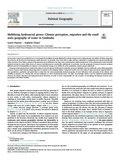| dc.contributor.author | Parsons, Laurie | |
| dc.contributor.author | Chann, Sopheak | |
| dc.date.accessioned | 2021-02-24T11:40:29Z | |
| dc.date.available | 2021-02-24T11:40:29Z | |
| dc.date.issued | 2019 | |
| dc.identifier.citation | Laurie Parsons, Sopheak Chann, Mobilising hydrosocial power: Climate perception, migration and the small scale geography of water in Cambodia, Political Geography,
Volume 75, 2019, 102055, ISSN 0962-6298,
https://doi.org/10.1016/j.polgeo.2019.102055 | |
| dc.identifier.uri | https://opendocs.ids.ac.uk/opendocs/handle/20.500.12413/15990 | |
| dc.description.abstract | As successive reports have predicted tens or even hundreds of millions of people displaced by climate change in the coming decades, the politics of climate migration has moved to the forefront of contemporary public discourse. In particular, those least able to adapt and most vulnerable to exploitation have garnered media and policy attention. Nevertheless, analysis of this phenomenon is inhibited by the large scale, predominantly unidirectional nature of the phenomenon's social scientific analysis, leaving the power laden nature of resource and infrastructure persistently underplayed. In particular, how the geography of natural resources produces different patterns of (im)mobility in response to environmental change, even within the same community, remains poorly understood. Drawing on data gleaned from a multi-sited study of rural and migrant livelihoods in Cambodia, this paper highlights how the small scale, power-laden geography of water resources and irrigation shapes migration in response to the changing climate. Using brick workers as a case study of ‘hyper-precarious’ migrant labour, it uses quantitative, qualitative and spatial data to show how the socio-economically situated geography of water influences both perception of the climate, and mobility in response to it. Viewing this resource landscape as a form of hydrosocial power, the paper overarchingly makes a case for enhanced communication between the climate migration and hydrosocial power literatures, in order to better conceptualise the role of power in articulating the linkages between water geographies and climate mobility. | |
| dc.publisher | Elsevier Ltd | |
| dc.rights.uri | http://creativecommons.org/licenses/by/4.0/ | |
| dc.title | Mobilising Hydrosocial Power: Climate Perception, Migration and the Small Scale Geography of Water in Cambodia | |
| dc.type | Article | |
| dc.rights.holder | © 2019 The Authors. Published by Elsevier Ltd | |
| dc.identifier.externaluri | https://www.sciencedirect.com/science/article/pii/S0962629819300459 | |
| dc.identifier.ag | ES/R00238X/1 | |


